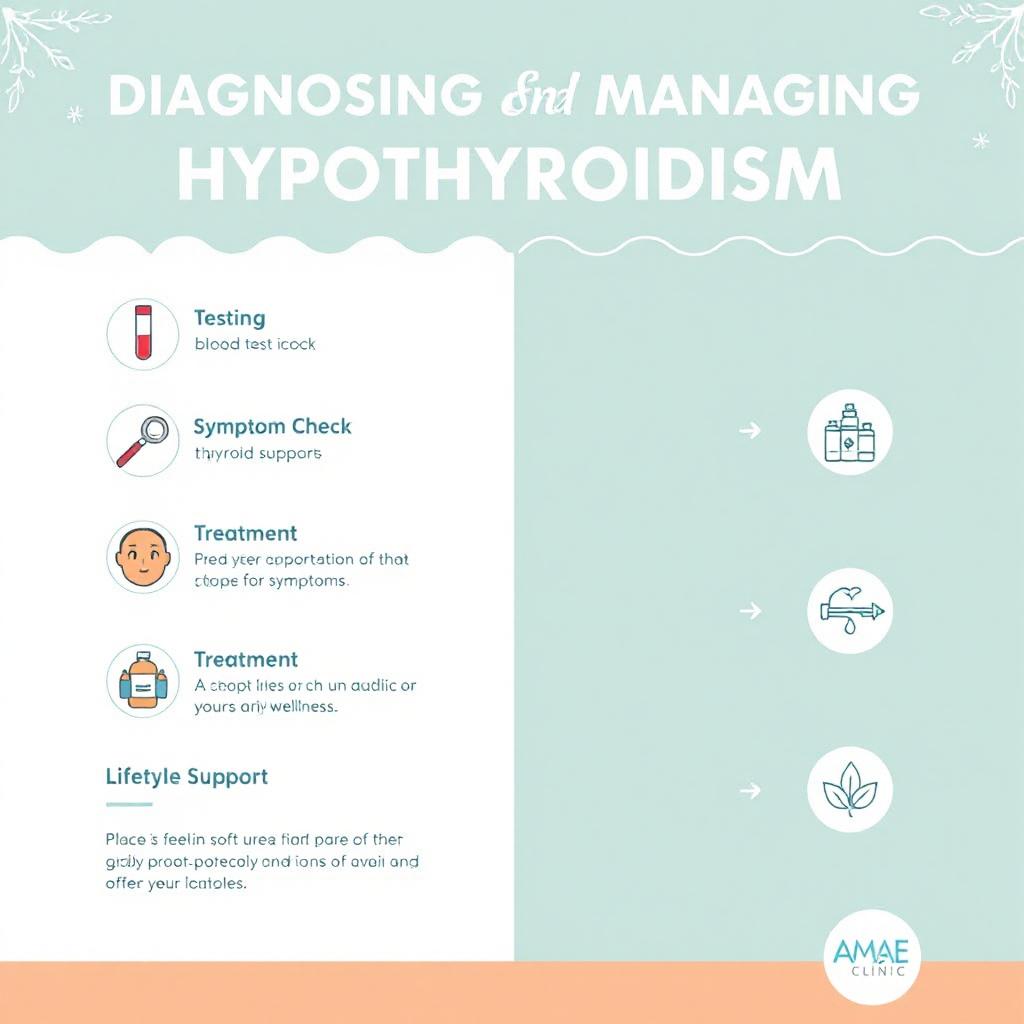Hypothyroidism is a complex condition, but understanding how it’s diagnosed and managed can make the journey easier. Recognizing symptoms, getting the right diagnosis, and staying on top of treatment are key to thriving with an underactive thyroid. AMAE Clinic is here with comprehensive testing, consultations, and ongoing support to guide you.
1. Recognizing the Signs of Hypothyroidism 🧐
Before even getting to a formal diagnosis, noticing symptoms like fatigue, dry skin, or weight gain is often the first clue. The thyroid influences nearly every cell in the body, so when it’s underactive, symptoms can affect many systems.
Self-Check: If you’re experiencing these signs, consider scheduling a consultation to discuss potential thyroid testing.
2. Thyroid Function Test: TSH and T4 Levels 🧪
A Thyroid Function Test (TFT) is the first step in diagnosing hypothyroidism. This blood test measures Thyroid Stimulating Hormone (TSH) and Thyroxine (T4) levels, the key indicators of thyroid health. Generally, high TSH levels with low T4 confirm hypothyroidism.
What This Means for You: TSH and T4 results give us insight into your thyroid function. We offer convenient thyroid testing services at AMAE to help you understand your levels and what they mean for your health.
3. Subclinical Hypothyroidism: When TSH is High but T4 is Normal 🔎
In some cases, TSH may be high while T4 remains normal. This is known as subclinical hypothyroidism and often presents with mild symptoms. While not everyone needs treatment, it’s essential to monitor these levels over time, especially if symptoms worsen.
Key Insight: If you’ve been told you have subclinical hypothyroidism, regular testing can track changes. AMAE offers follow-up testing and guidance on managing symptoms and adjusting treatment as needed.
4. T3 and Other Blood Tests: Exploring Further 🩸
For more complex cases, additional tests may be recommended, such as measuring Triiodothyronine (T3) or looking for thyroid antibodies. These tests help to rule out other thyroid issues or autoimmune causes like Hashimoto’s disease.
Additional Testing Options: If basic testing doesn’t clarify your thyroid status, we can arrange advanced thyroid panels and antibody tests to provide a full picture.
5. Treatment Options: T4 Replacement Therapy 💊
The primary treatment for hypothyroidism is T4 replacement therapy, which supplements the thyroid hormone you’re lacking. Levothyroxine, a synthetic T4 hormone, is commonly prescribed, and doses are adjusted based on TSH levels to meet individual needs.
Managing Your Treatment: AMAE Clinic can prescribe T4 and help you monitor and adjust your treatment to ensure optimal thyroid function and symptom relief.
6. Monitoring Progress: Why Regular Testing is Crucial 🗓️
Once treatment starts, regular blood tests are key to tracking progress. TSH levels should be checked every 6-12 months to make sure the dose is effective and doesn’t need adjustment. Symptoms often guide adjustments, as thyroid needs can change over time.
Keep Track of Your Health: Staying proactive is essential in managing hypothyroidism. Schedule routine follow-up tests with us to maintain stable thyroid levels and adjust treatment as necessary.
7. Lifestyle Support: Beyond Medication 🌱
Medication is only part of the picture. A balanced lifestyle that includes good nutrition, regular exercise, and stress management supports overall thyroid health and can improve quality of life.
Full Support for Your Journey: AMAE Clinic offers lifestyle guidance, nutrition advice, and additional support to help you manage hypothyroidism holistically.
8. Side Effects and Adjustments ⚠️
Finding the right dose may take a few adjustments, as too much T4 can lead to symptoms of hyperthyroidism (like restlessness and palpitations). Staying in regular contact with your provider is essential to stay within the optimal range.
Safe and Effective Treatment: If you notice new or unusual symptoms, reach out to adjust your treatment as needed. We’re here to make sure you feel your best.
9. Managing Hypothyroidism Long-Term 🕰️
Hypothyroidism is generally a lifelong condition, but with proper care, you can lead a healthy, active life. Staying consistent with treatment and regular check-ups is essential to keep symptoms under control and prevent complications.
Planning for the Future: Let’s work together to keep your thyroid health on track. Book your ongoing care and follow-up consultations with AMAE for a proactive approach.
Your Partner in Thyroid Health: AMAE Clinic
Whether you’re just starting on the journey with hypothyroidism or looking for comprehensive, long-term support, AMAE Clinic offers testing, personalized care, prescriptions, and holistic guidance tailored to your unique health needs. We’re here to make hypothyroidism management as smooth as possible.
Take the Next Step: Reach out today to schedule a thyroid assessment and take control of your health.
